Related Research Articles

The Cthulhu Mythos is a mythopoeia and a shared fictional universe, originating in the works of Anglo-American horror writer H. P. Lovecraft. The term was coined by August Derleth, a contemporary correspondent and protégé of Lovecraft, to identify the settings, tropes, and lore that were employed by Lovecraft and his literary successors. The name "Cthulhu" derives from the central creature in Lovecraft's seminal short story "The Call of Cthulhu", first published in the pulp magazine Weird Tales in 1928.

Cthulhu is a fictional cosmic entity created by writer H. P. Lovecraft. It was introduced in his short story "The Call of Cthulhu", published by the American pulp magazine Weird Tales in 1928. Considered a Great Old One within the pantheon of Lovecraftian cosmic entities, this creature has since been featured in numerous pop culture references. Lovecraft depicts it as a gigantic entity worshipped by cultists, in the shape of a green octopus, dragon, and a caricature of human form. It is the namesake of the Lovecraft-inspired Cthulhu Mythos.

Shub-Niggurath is a deity created by H. P. Lovecraft. She is often associated with the phrase "The Black Goat of the Woods with a Thousand Young". The only other name by which Lovecraft referred to her was "Lord of the Wood" in his story The Whisperer in Darkness.
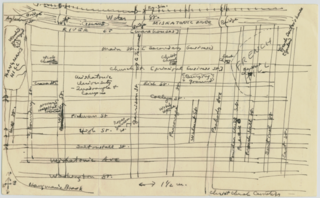
Arkham is a fictional city situated in Massachusetts, United States. An integral part of the Lovecraft Country setting created by H. P. Lovecraft, Arkham is featured in many of his stories and those of other Cthulhu Mythos writers.
Arkham House was an American publishing house specializing in weird fiction. It was founded in Sauk City, Wisconsin, in 1939 by August Derleth and Donald Wandrei to publish hardcover collections of H. P. Lovecraft's best works, which had previously been published only in pulp magazines. The company's name is derived from Lovecraft's fictional New England city, Arkham, Massachusetts. Arkham House editions are noted for the quality of their printing and binding. The printer's mark for Arkham House was designed by Frank Utpatel.

Brian Lumley was an English author of horror fiction. He came to prominence in the 1970s writing in the Cthulhu Mythos created by American writer H. P. Lovecraft but featuring the new character Titus Crow, and went on to greater fame in the 1980s with the best-selling Necroscope series, initially centered on character Harry Keogh, who can communicate with the spirits of the dead.
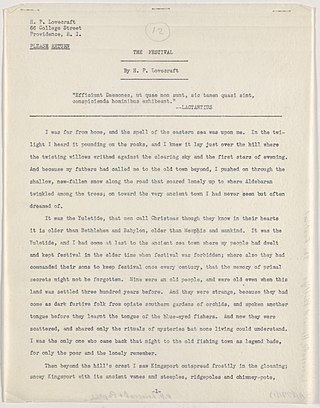
"The Festival" is a short story by H. P. Lovecraft written in October 1923 and published in the January 1925 issue of Weird Tales.
The Xothic legend cycle is a series of short stories by American writer Lin Carter that are based on the Cthulhu Mythos of H. P. Lovecraft, primarily on Lovecraft's stories "The Call of Cthulhu" and "Out of the Aeons".
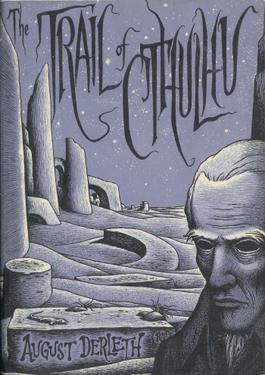
The Trail of Cthulhu is a series of interconnected short stories by American writer August Derleth as part of the Cthulhu Mythos genre of horror fiction. The stories chronicle the struggles of Laban Shrewsbury and his companions against the Great Old Ones, particularly Cthulhu.

The Lurker at the Threshold is a horror novel by American writer August Derleth, based on short fragments written by H. P. Lovecraft, who died in 1937, and published as a collaboration between the two authors. According to S. T. Joshi, of the novel's 50,000 words, 1,200 were written by Lovecraft.
"To Arkham and the Stars" is a short story by American writer Fritz Leiber that belongs to the Cthulhu Mythos genre of horror fiction. It was written for the 1966 Arkham House anthology The Dark Brotherhood and Other Pieces. Set in H. P. Lovecraft's Arkham and Miskatonic University, it includes characters from and allusions to several Lovecraft stories.
A Cthulhu Mythos anthology is a type of short story collection that contains stories written in, or related to, the Cthulhu Mythos genre of horror fiction launched by H. P. Lovecraft. Such anthologies have helped to define and popularize the genre.

Dark Things is an anthology of horror stories edited by American writer August Derleth. It was released in 1971 by Arkham House in an edition of 3,051 copies. It was Derleth's fourth anthology of previously unpublished stories released by Arkham House. A translation in Japanese has also been released.
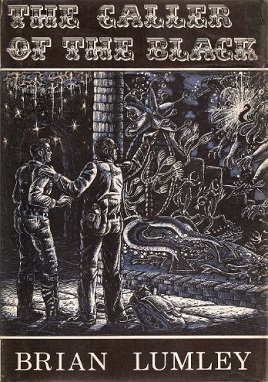
The Caller of the Black is a collection of stories by British writer Brian Lumley. It was released in 1971 and was the author's first collection of stories published by Arkham House. It was published in an edition of 3,606 copies. Many of the stories are of the Cthulhu Mythos.

Gary Clayton Myers is an American writer of fantasy and horror. He is a resident of Fullerton, California.
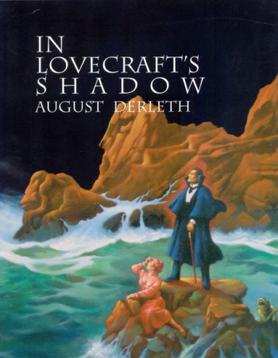
In Lovecraft's Shadow: The Cthulhu Mythos Stories of August Derleth is a collection of fantasy and horror short stories by American writer August Derleth. It was released in 1998 by Mycroft & Moran in an edition of 2,051 copies.

Cthulhu Mythos deities are a group of fictional deities created by American author H. P. Lovecraft (1890–1937), and later expanded by others in the fictional universe known as the Cthulhu mythos.
References
- ↑ Lumley, Brian (2008). "Lord of the Worms". The Taint and other novellas (Reprint ed.). Nottingham: Solaris. p. 306. ISBN 978-1844166374.
- ↑ Brian Lumley, "Mail-Call of Cthulhu", Black Forbidden Things, p. 194.
- ↑ ["An Interview with Brian Lumley"], by Robert M. Price, Nightscapes No. 5.